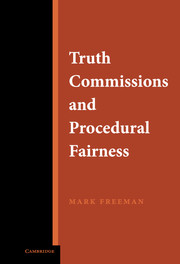Book contents
- Frontmatter
- Contents
- Foreword
- Preface
- Acknowledgments
- Abbreviations
- Part I
- Part II
- 3 Statement Taking
- 4 Subpoena Power
- 5 Search and Seizure Power
- 6 Public Hearings
- 7 Publication of Findings of Individual Responsibility
- Summary of Recommendations
- Appendix 1 Table of Truth Commissions
- Appendix 2 Primary Materials on Truth Commissions
- Appendix 3 Primary Materials on Other Commissions of Inquiry
- Index
3 - Statement Taking
Published online by Cambridge University Press: 27 October 2009
- Frontmatter
- Contents
- Foreword
- Preface
- Acknowledgments
- Abbreviations
- Part I
- Part II
- 3 Statement Taking
- 4 Subpoena Power
- 5 Search and Seizure Power
- 6 Public Hearings
- 7 Publication of Findings of Individual Responsibility
- Summary of Recommendations
- Appendix 1 Table of Truth Commissions
- Appendix 2 Primary Materials on Truth Commissions
- Appendix 3 Primary Materials on Other Commissions of Inquiry
- Index
Summary
Introduction
Truth commissions tend to collect most of their information through “statement taking.” This term refers to private meetings and interviews conducted primarily by commission staff with persons wishing to make formal statements to the commission.
Statement taking is important in at least two ways: it advances a commission's truth-seeking objectives, and it provides an opportunity for victims and others to describe their traumatic experiences within a caring and generally safe environment. In the absence of statement taking, it is very difficult for a truth commission to fulfill its mission. Truth commissions often find that there is a dearth of “hard” or direct evidence about the atrocities under inquiry. Records are often destroyed or falsified in the transfer of power, and those that remain are likely to be incomplete or unreliable. This is true not only in countries with truth commissions, but also in those without.
Statement-taking work tends to begin shortly after a commission's installation and may continue through the life of the commission. For many commissions, statement taking is the primary activity in which it engages. As such, it also tends to be the activity wherein the commission interacts with the greatest number of people. Indeed, most truth commissions receive several thousand individual statements. Other human rights-related investigations (e.g., those by NGOs and UN war crimes commissions) also involve extensive statement taking.
Truth commission mandates generally allow for meetings with, and interviews of, any person.
- Type
- Chapter
- Information
- Truth Commissions and Procedural Fairness , pp. 159 - 187Publisher: Cambridge University PressPrint publication year: 2006



